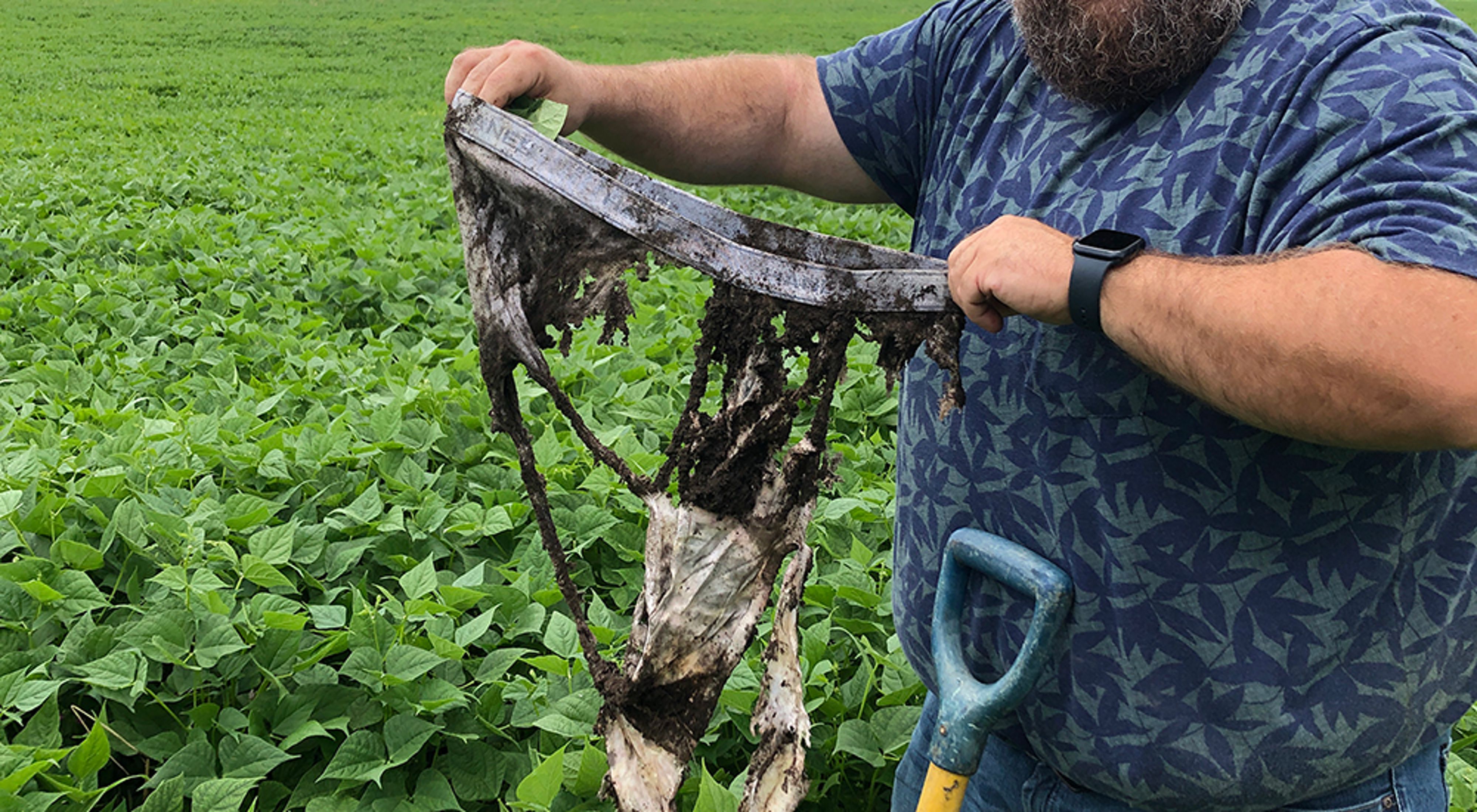The Nature Conservancy uses underwear to underscore importance of healthy soil practices
Results of “Soil Your Undies” challenge finds no-till farming, cover crops increase organic matter in soil
Media Contacts
-
Ryan Hermes
TNC
Phone: (517) 999-7745
Email: ryan.hermes@tnc.org
The Nature Conservancy this week released the results of its first-ever “Soil Your Undies” challenge during the Saginaw Watershed Farmer Network Field Day on Monday, July 25 at WMW Bierlein Farms in Reese, Mich.
The once bright white cotton underwear was buried in several fields, each managed differently, from no-till farming and cover crops to conventional till farming. The undies were unearthed Sunday after 40-days under the soil, some mostly in-tact while others just had a waistband and a few threads remaining.
“The results of our ‘Soil Your Undies’ challenge were abundantly clear: Farmers who implemented healthy soil practices had more biological activity in their soils, which led to a significant breakdown of the underwear,” said Ben Wickerham, Agriculture Program Director for The Nature Conservancy in Michigan. “These healthy soil practices do more than just break down cotton fabrics. They also help protect our drinking water, make fields more resilient to the effects of extreme weather events — like flooding and droughts — and grow high-quality crops.”
Quote: Ben Wickerham
The results of our ‘Soil Your Undies’ challenge were abundantly clear: Farmers who implemented healthy soil practices had more biological activity in their soils, which led to a significant breakdown of the underwear.
The field day also featured a rainwater demonstration from Michigan State University Extension, which showed how different field management practices impact soil runoff. The event concluded with a panel discussion headlined by farmers who lead peer-to-peer networking groups in the region that provide a platform for farmers to share their experiences on implementing healthy soil practices.
“It makes my stomach turn every time I see topsoil spilling into drainage ditches after a heavy rain, which is why I am working with several other farmers in our area to spread the word about the importance of implementing healthy soil practices,” said Wayne Bierlein, owner of WMW Bierlein Farms. “I would encourage any farmer who is even remotely interested in no-till farming, how to utilize cover crops, and other tried-and-true healthy soil practices to reach out with questions or attend one of our meetings.”
Quote: Wayne Bierlein
I would encourage any farmer who is even remotely interested in no-till farming, how to utilize cover crops, and other tried-and-true healthy soil practices to reach out with questions or attend one of our meetings.
“Our farmer-led peer groups here in Michigan and across the Midwest are vital to spreading the word about healthy soil and water management practices that keep our drinking water safe, make fields more resilient to floods and droughts, and help farmers innovate,” said Mary Fales, Soil Health and Nutrients Program Director for TNC’s Midwest Division. “The farmers leading these groups are walking the walk and are a great resource for other producers who want to save time and money by implementing these practices.”
The Saginaw Bay region is vital to Michigan’s agriculture and fishing industries. Roughly 20% of the state’s agricultural acres are in the 5.5-million-acre Saginaw Bay watershed, which features Michigan’s highest concentration of prime farmland, an abundance of water resources, and ideal growing conditions that support a diversity of crops not seen anywhere else in the Midwest.
The watershed drains into Saginaw Bay, which provides drinking water to several major communities. It also supports a thriving recreational fishery and boating industry, attracts thousands of visitors each year and is a critical area for migratory birds and Lake Huron fisheries.
“Healthy soil practices, like reduced tillage, planting cover crops and nutrient management, are good for crops, good for our water quality and good for farmers’ bottom line,” Wickerham said. “That means a win across the board for all Michiganders and the land and water that makes our state so special.”
The Nature Conservancy is a global conservation organization dedicated to conserving the lands and waters on which all life depends. Guided by science, we create innovative, on-the-ground solutions to our world’s toughest challenges so that nature and people can thrive together. We are tackling climate change, conserving lands, waters and oceans at an unprecedented scale, providing food and water sustainably and helping make cities more sustainable. The Nature Conservancy is working to make a lasting difference around the world in 77 countries and territories (41 by direct conservation impact and 36 through partners) through a collaborative approach that engages local communities, governments, the private sector, and other partners. To learn more, visit nature.org or follow @nature_press on X.
